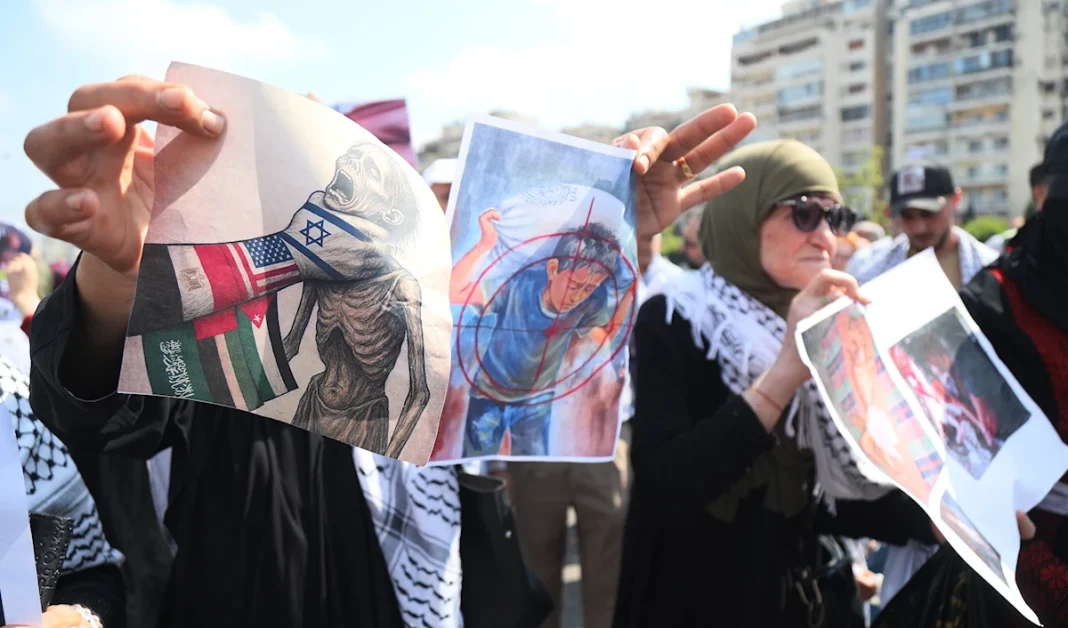Dozens of protesters gathered outside the Egyptian Embassy in Beirut on Monday afternoon to demand the immediate reopening of the Rafah border crossing between Egypt and the besieged Gaza Strip, as famine tightens its grip on the population and humanitarian aid rots in Egyptian warehouses. The demonstration quickly swelled in size as buses transporting protestors arrived from Palestinian camps across Lebanon.
The entrance to the Egyptian Embassy was barricaded by the Lebanese army and security forces from both sides. Participants waved Palestinian flags, held up pictures of starving children in northern Gaza, and carried banners that read: “Open Rafah Now,” “Starvation is a War Crime,” and “Aid is Not a Weapon.” The air was thick with chants condemning Egypt’s complicity in the blockade.
The protesters specifically called on Egyptian President Abdel Fattah el-Sisi to halt what they called a “deliberate and deadly blockade policy” by opening the crossing and facilitating the immediate entry of food, medical supplies, and fuel into Gaza. Several prominent Lebanese and Palestinian public figures took part in the protest, including representatives from the Palestinian Cultural Club and Palestinian Youth Movement.
“We’re here because we can’t stay silent while our people in Gaza starve,” said 22-year-old Layal Abu Hijleh, a Palestinian university student from the Mar Elias camp in Beirut. “We know aid is waiting in Rafah. Egypt needs to open the gates. Not in a week, not tomorrow, but now.”
Another protester, Jamal Mansour, who traveled from Baalbek, said he came because the siege has gone too far. “Egypt says it supports the Palestinian cause, but it is guarding the gates of famine.”
The protest remained peaceful for nearly two hours. But tensions rose toward the end of the protest when a group of protesters attempted to enter the embassy premises. Lebanese Army soldiers stationed outside the embassy blocked the group from advancing, forming a human barrier. Scuffles soon broke out, and several protesters were beaten by Lebanese army men as onlookers screamed in protest.
A statement released following the protest by Free Palestine Front, one of the participating groups, read: “Gaza, like South Lebanon, stands alone against a project that threatens to dominate our entire region: the project of Zionist expansion, and the project of submission to American imperialism.”
The group decried the shameful apathy of Arab regimes and their direct collaboration with the occupation: “It is inconceivable that Egypt, Jordan, the UAE, and all Arab governments stand powerless to deliver medicine and aid. On the contrary, our states are suppressing demonstrations in support of Gaza, blocking convoys that seek to break the siege, and cooperating economically and militarily with the Zionist enemy by intercepting missiles that threaten its security and providing it with land and air corridors.”
Egypt’s role in starving Gaza
Egypt’s decision to maintain the blockade played a critical role in Gaza’s catastrophic humanitarian crisis. Since May 2024, following Israel’s military seizure of the Palestinian-controlled side of the crossing, Egypt has kept Rafah effectively closed from its side, asserting that the exit gate cannot operate without coordination with a functioning Palestinian Authority.
The Egyptian government refuses to reopen the crossing, even as food, medicine, and fuel accumulate in North Sinai warehouses, and are left to spoil.
The impact on Gaza is stark. The UN warns nearly half a million people face famine, fuel shortages are critically undermining bakeries and hospitals, and malnutrition-related deaths are nearing catastrophic levels. While aid convoys through Rafah remain barred, Gaza’s last relief lines have been drastically curtailed. Reports detail dire scenes of people collapsing just to reach UN or NGO food hubs, and over 1,000 individuals have died seeking aid since May.
